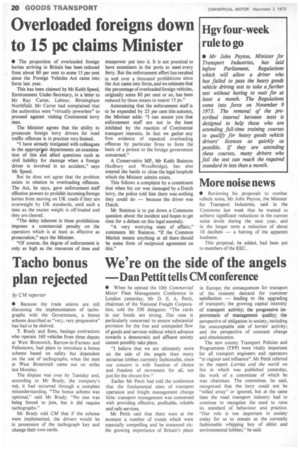Tacho bonus We're on the side of the angels
Page 22

If you've noticed an error in this article please click here to report it so we can fix it.
plan rejected —Dan Pettit tells CM conference
by CM reporter • Because the trade unions are still discussing the implementation of tachographs with the Government, a bonus scheme described as "very, very progressive" has had to be shelved.
T. Brady and Sons, haulage contractors who operate 160 vehicles from three depots at West Bromwich, Barrow-in-Furness and Felixstowe, had plans to introduce a bonus scheme based on safety but dependent on the use of tachographs, when the men at West Bromwich came out on strike last Monday.
The dispute was over by Tuesday and, according to Mr Brady, the company's md, it had occurred through a complete misunderstanding. "The bonus scheme was optional," said Mr Brady. "No one was being forced to join, but it did require tachographs."
Mr Brady told CM that if the scheme were implemented, the drivers would be in possession of the tachograph key and change their own cards. • When he opened the 10th Commercial Motor Fleet Management Conference in London yesterday, Mr D. E. A. Pettit, chairman of the National Freight Corporation, told the 500 delegates: "The cards in our hands are strong. Our case is particularly concerned to ensure substantial provision for the free and unimpeded flow of goods and services without which advance towards a democratic and affluent society cannot possibly take place.
"I believe that we are ultimately more on the side of the angels than many sectarian lobbies currently fashionable, since our concern is with freedom of choice and freedom of movement for all, not just for the chosen few."
Earlier Mr Pettit had told the conference that the fundamental aims of transport operation and freight management change little; transport management was concerned with providing effective, profitable, reliable and safe services.
Mr Pettit said that there were at the moment a number of trends which were especially compelling and he instanced six: the growing importance of Britain's place in Europe; the consequences for transport of the insistent demand for customer satisfaction — leading to the upgrading of transport; the growing capital intensity of transport activity; the progressive improvement of management quality; the perspective of obligation in society, including the unacceptable side of lorries' activity; and the perspective of constant change and obsolescence.
The new county Transport Policies and Programmes (TPP) were vitally important for all transport engineers and operators "to register and influence". Mr Pettit referred to the report Lorries and the world we live in which was published yesterday, the work of a committee of which he was chairman. The committee, he said, recognized that the lorry could not be "willed awayor ignored, but at the same time the road transport industry had to continue to recognize the need to raise its standard of behaviour and practice. "Our role is too important in society today for us to remain as the currently fashionable whipping boy of elitist and environmental lobbies," be said.
























































































































